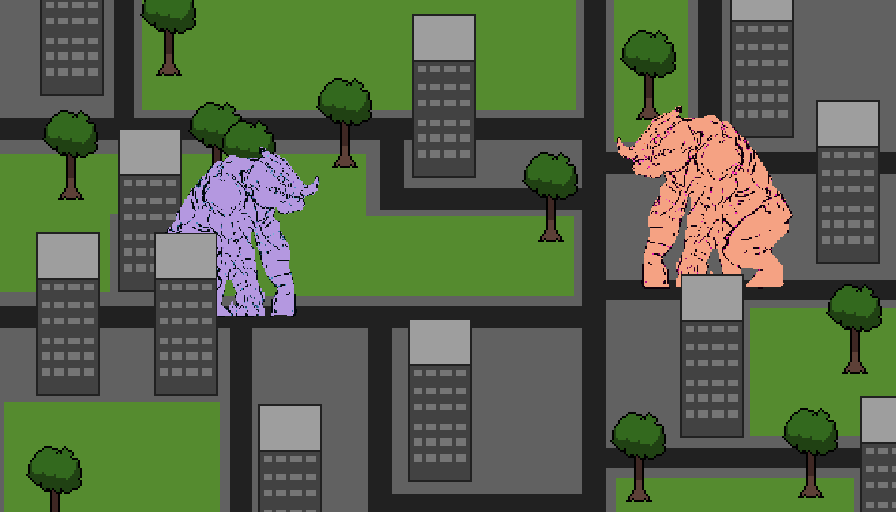I'm needing advice to get going with a project and taking it to completion.
Hi :)
I have an idea for a game. It's a Kaiju / Giant monster brawler type game with research and resource management aspects.
Here is a quick mock-up of the game-view:

A problem I've had is that I wasn't deeply interested in my own projects and therefore didn't complete them.
I had a look a this video..

It helped a lot as a start.
What sort of development methodology do successful game devs use?
I have heard of the 'Agile' methodology, is it a good way of going about development?
I have an idea for a game. It's a Kaiju / Giant monster brawler type game with research and resource management aspects.
Here is a quick mock-up of the game-view:

A problem I've had is that I wasn't deeply interested in my own projects and therefore didn't complete them.
I had a look a this video..

It helped a lot as a start.
What sort of development methodology do successful game devs use?
I have heard of the 'Agile' methodology, is it a good way of going about development?


Mockup screen.png
896 x 512 - 25K

Comments
1. Don't care so much whether they "complete" a project, but rather keep making stuff to a) practice and hone their own skills and b) try different things until they hit on something that is well received by others.
2. Prototype, prototype, prototype.
3. Prototype some more.
4. Get lots of feedback from as many people as possible, preferably complete strangers.
5. Are not precious about ideas. The worst ideas could birth the best games. Game development is not about ideas.
OR:
1. Have a lot of money to pay for other people to do the above.
OR:
1. Get very lucky. I don't know how to actively achieve this one other than throwing the dice many many times, which is what the first set of stuff tries to achieve - keep trying.
The above is probably not exhaustive.
1. It needs to be a game that we actually have the skills to make. (If we don't have the skills, we should be able to acquire the skills we need fairly easily, like being able to learn and R&D things in game jams, or collaborate with/hire someone who has the skills we lack.)
2. It needs to be a game that excites the people whose skills we need to work on it. Making a game is hard work, and could take years. If it's not a game you're going to enjoy working on, you're going to have a really bad time, and chances of the project grinding to a halt increase.
3. It needs to be something we can test along the way -- test whether players enjoy it, test whether there's a market for it, test whether it's a project that needs to be shelved in favour of something else. We don't want to work for a long time in the dark, and then discover far too late that we've wasted our resources. (We can always make more money, but our lives are finite, and we don't want to spend years of our lives on something we don't have evidence to be confident in.)
--
These are mainly for us as a studio, but I think they apply to smaller (lone) devs too, in many ways:
1a. Choose games that have a scope that you're actually capable of finishing. You can't know what you're capable of finishing without trying to make a bunch of games first, so for your first bunch of games you really can't even be aiming to finish them, because you don't actually know what that even means. (You can't scope if you don't know how long things take to do. You can't know what needs doing if you've never done it before -- many times things are more complicated than you originally thought.)
1b. Gain skills to help you be able to finish the games that you're already scoping smaller. You can do this by making even smaller games (i.e. game jams, prototypes).
2. Try to pick ideas/themes/mechanics/art/etc that are likely to excite the people who will work on it, including both you and the people who have the skills you don't have that you might need to entice/convince to work on it. (Or have the money to pay them -- but even if/when you're paying them, you still want them to be excited to work on it.)
3. Regularly test your games, trying to gauge interest (do you get replies to your game posts? Views on your YouTube gameplay captures? Do people stream it on Twitch or YouTube of their own accord? Are there similar games that have done well in the past that you think you could compare favourably against?).
People do often talk about how finishing something is a skill in itself, and that's true, but if it's a project that you're confident you have the ability to finish, and that you have evidence should be a success (whatever metric you use for that), then it becomes much easier for the motivation to carry you through the slog-work (UI, bug fixing, perf, store-related things, trailers, etc.) when the time comes for that.